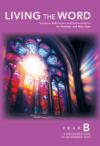Understanding the Word
By Br. John R. Barker, OFM
The passage from Nehemiah depicts the renewal of the relationship between God and Israel after the Exile. After hearing Ezra read the entire book of the covenant, the people respond “Amen, amen,” reaffirming their commitment to the covenant relationship. The scene is reminiscent of earlier moments in Israel’s history in which the covenant was established or renewed (Exodus 24:1–8; Joshua 24:1–28; 2 Kings 23:1–3). The event not only represents a fresh start for Israel but also reminds the reader that with God such a fresh start is always possible. This is why the people are to rejoice and feast, for their strength lies not in themselves but in their God.
The gifts given to the Corinthians have led, against the intentions of the Spirit, to division. Human pride has tempted some to set themselves over others, suggesting that some gifts are more important than others. Paul reminds the Corinthians that they are a single “body,” whose various parts (those who have received different gifts) are all necessary for its health. At the same time, no single part (gift) can function on its own apart from the others. All gifts are necessary, and none is sufficient unto itself. In the same way, the Corinthians must see themselves as a single organic body whose various parts need each other to be healthy and whole, in the way the Spirit intends.
We commence our reading of the Gospel of Luke with the beginning of Jesus’ ministry. Jesus inaugurates his mission in his hometown by announcing that with him the ancient hopes of Israel are being fulfilled. The “year acceptable to the Lord” refers to the jubilee year in which debts were released and any land or other property that had been sold or given away by the poor was returned (Leviticus 25:10–11). This year was ordained by God to restore Israelite society after human nature had led some to “bind” others in debt and even oppression. Thus Jesus announces that in him God has come to release everyone from the effects of human sin.
